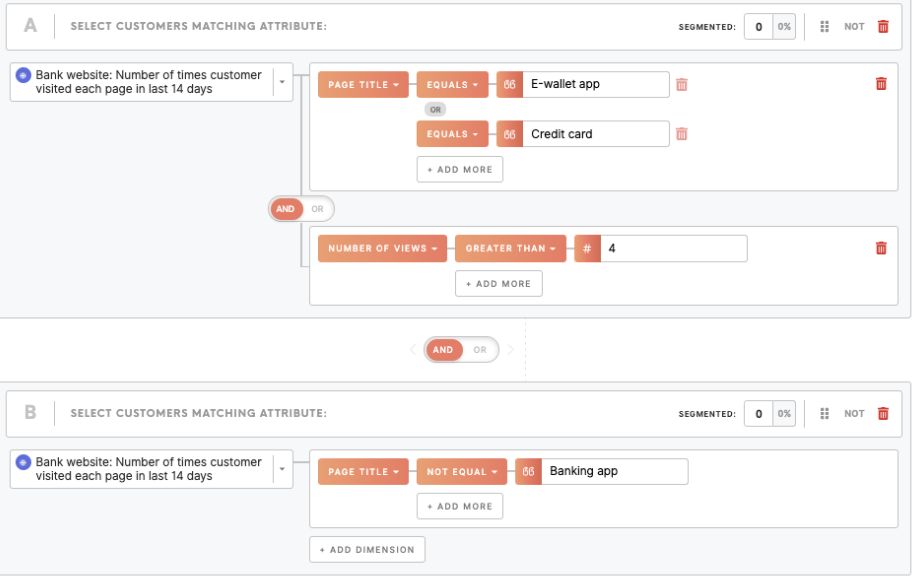Simple way to save marketing budget & time with Meiro & Mailchimp
1. Benefits of Meiro & Mailchimp paired together
| Precise targeting |
One of the strong points of Meiro Business Explorer is that Meiro’s identity resolution algorithms stitch the data from various data sources. This way, Meiro holds more information about customers than any other tool. The segmented audience is more precise, therefore campaigns are more likely to reach the right people.
Merging Meiro with Mailchimp can increase the open rate by 200%, and click rate by 400 % (we checked this out) i.e. combine website behaviour with people who have visited product pages A and B, that have more than 4 page views per session but have not visited page D. |
| Measure your success |
In Meiro, it is possible to see each individual customer profile and timeline of customers actions. Once you send a campaign, you can view customer profiles of those who opened them and performed further action from there. With this, you can easily check if the campaign has met your goals and if your campaign efforts worked.
|
| Check the results & follow up |
Segment customers that opened your campaign, made a purchase, and send them a promo code or other rewards.
Segment customers who opened campaigns or shopping cards, but quitted, and resend them personalised messages.
Segment audience that opened your Mailchimp campaign and activated it in other channels e.g. Facebook Ads, Google Ads and more. |
2. How to do it
| Know your objectives well |
Set clear goals, what are you trying to achieve? Draw a simple customer journey and think what ideally would be a result of your Mailchimp campaign. Think of who is your target audience.
|
| Personalize your audience |
Based on the above objectives segment the right audience. For example:
To promote content targeted for retail audiences, segment customers that have read similar articles already, that you know are categorised as retailers, that are submitted to your newsletter and given contact details.
To promote general content, define which customers may be interested and widen your audience (e.g. marketers, publishers, advertisers), perhaps the ones that clicked on the content of similar type, who subscribed to the newsletter.
|
|
Exclude
|
Think if you do not need to exclude anybody from your campaign e.g. competitors or customers you know would not like this content (e.g. non-technical customers for quite techy content).
|
| Follow up with customers that reacted to your newsletter |
Segment customers that clicked on your article and send a follow up on the next step (offer demo calls, or support of other kinds).
Segment customers that opened the newsletter you sent and check their customer profiles, if there was an interesting pattern in actions following the newsletter. Check if the goals you set were achieved.
|
3. Practical example
Imagine you schedule a webinar that you wish to promote through the Mailchimp campaign. Let's say your campaign is designed for other marketers, but this is a webinar only for the audience that attended your previous webinars.
Segment your audience: marketers that already attended previous webinars. Probably you would like to exclude contacts that seem from competitors or customers that did not behave well on a previous webinar.
Export segment to Mailchimp and send a campaign.
Follow up with all customers that clicked on the campaign but did not sign up. Segment customers that received the campaign, clicked on the campaign but did not sign up.
Check out the profiles of customers that attended the webinar and see if the desired next action was done e.g. demo scheduled, purchase or contact with the sales team or customer service (whichever of those were your objective).

